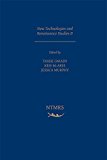
Early Modern Studies after the Digital Turn PDF
388 Pages·2016·20.8229 MB·other
Most books are stored in the elastic cloud where traffic is expensive. For this reason, we have a limit on daily download.
Preview Early Modern Studies after the Digital Turn
Description:
The essays collected in this volume address the digital humanities’ core tensions: fast and slow; surficial and nuanced; quantitative and qualitative. Scholars design algorithms and projects to process, aggregate, encode, and regularize historical texts and artifacts in order to position them for new and further interpretations. Every essay in this book is concerned with the human-machine dynamic, as it bears on early modern research objects and methods. The interpretive work in these pages and in the online projects discussed orients us toward the extensible future of early modern scholarship after the digital turn.ChaptersIntroductionLaura Estill, Diane K. Jakacki, Michael UllyotBooks in Space: Adjacency, EEBO-TCP, and Early Modern DramatistsMichael Witmore and Jonathan HopePlotting the “Female Wits” Controversy: Gender, Genre, and Printed Plays, 1670–1699Mattie BurkertA Bird’s-Eye View of Early Modern Latin: Distant Reading, Network Analysis, and StyleMaciej EderDisplaying Textual and Translational Variants in a Hypertextual and Multilingual Edition of Shakespeare’s Multi-text PlaysJesús TronchRe-Modeling the Edition: Creating the Corpus of Folger Digital TextsRebecca Niles and Michael PostonCollaborative Curation and Exploration of the EEBO-TCP CorpusMartin Mueller, Philip R. Burns, and Craig A. Berry“Ill shapen sounds, and false orthography”: A Computational Approach to Early English Orthographic VariationAnupam BasuLinked Open Data and Semantic Web Technologies in Emblematica OnlineTimothy W. Cole, Myung-Ja K. Han, and Mara R. WadeMapping Toponyms in Early Modern Plays with the Map of Early Modern London and Internet Shakespeare Editions Projects: A Case Study in InteroperabilityJanelle Jenstad and Diane K. JakackiMicrostoria 2.0: Geo-locating Renaissance Spatial and Architectural HistoryFabrizio NevolaGazing into Imaginary Spaces: Digital Modeling and the Representation of RealityJohn N. WallCambridge Revisited?: Simulation, Methodology, and Phenomenology
See more
The list of books you might like
Most books are stored in the elastic cloud where traffic is expensive. For this reason, we have a limit on daily download.
